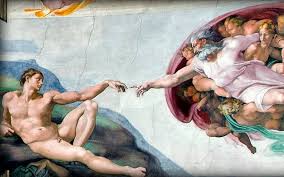
Who, or What, is God?
Do you ever stop to think about who, or what God is, and where we get our image of God?
The title of this blog, “Who or What is God?” itself begs the question. Is God a who or a what? I’ll get back to that later, but theologians say we know God only by analogy, that is, only by comparing him or her to what we know from human experience.
I would say that we have three main sources for our knowledge of God, at least in the Judeo-Christian tradition. The first is the Bible, from which the majority of our ideas about God come; the second is philosophical speculation, and the third is “direct” experience with God.
Mere Human Feeling?
Let’s start with the latter. As I have written, I practice “Centering Prayer,” a kind of meditation one of whose goals is to help the pray-er be more aware of God’s presence. During 20-minute early-morning meditations, I sometimes feel God’s presence, sometimes not. To be honest, I’m not sure whether my sense of God’s presence is a mere human feeling or whether God is making himself felt. Either way, I see it as useful for my spiritual life.
Having read about and studied saints, philosophers and mystics who have lived throughout the ages, I know that many people have said they have had a direct experience of God. Although I’m skeptical, I don’t have good reason to doubt them.
Regarding the Bible, it presents a mixed bag about who and what God is. The most profound, and enigmatic, description of God, in my view, is in the Book of Exodus where God is made to say, “I am who am.” One interpretation is that the biblical author is saying that God is real, unlike the idols worshipped by Israel’s neighbors.
In the Hebrew Bible especially, God is sometimes presented as an authoritarian who punishes people who fail to comply with religious mandates. This reflects the age in which it was written, in which punishment was freely meted out by the powerful. And who is more powerful than God, the creator of the universe?
Loving, but Complaining
On the other hand, God in the Hebrew Bible can be a loving, but complaining parent, as touchingly presented in this passage from Hosea, a prophet from the eighth century before Christ.
Thus says the Lord: When Israel was a child I loved him, out of Egypt I called my son. The more I called them, the farther they went from me, sacrificing to the Baals and burning incense to idols. Yet it was I who taught Ephraim (an Israelite tribe here seemingly representing all of Israel) to walk, who took them in my arms; I drew them with human cords, with bands of love; I fostered them like one who raises an infant to his cheeks; Yet, though I stooped to feed my child, they did not know that I was their healer.
The Christian Bible makes the image of God clearer. Although there are still remnants of the tyrannical God, the image gradually changes to one of a loving father, as presented in the parable of the Prodigal Son.
Influential Philosopher and Theologian
Lastly, we have the “image” presented by philosophers throughout the ages, principally Thomas Aquinas. An Italian Dominican friar and priest, Aquinas was an influential philosopher and theologian in the 13th century who came up with five logical arguments for the existence of God, which I believe are still useful today.
Aquinas argued that God is the source of our natural reason and faith. He deduced eight attributes God must have: simplicity, perfection, goodness, infinity, ubiquity, immutability, eternity and unity. He taught that faith and reason are the two primary ways to gain true knowledge of God.
People searching for God in the Judeo-Christian tradition, it seems to me, are searching for a “who” (loving father) as well as a “what” (creator of the universe), and there are plenty of rational reasons for both.



